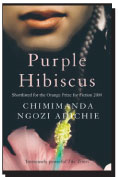Purple Hibiscus By Chimamanda Ngozi Adichie (Fourth Estate)
 Chimamanda Ngozi Adichie is one of my favourite ‘young’ authors. There is something unpretentious yet arresting about her writing that deeply attaches you to the plight of her characters.
Chimamanda Ngozi Adichie is one of my favourite ‘young’ authors. There is something unpretentious yet arresting about her writing that deeply attaches you to the plight of her characters.
Her breakthrough novel Purple Hibiscus is told from the viewpoint of Kambili, a young teenager raised in a wealthy and pious Nigerian household. But this household has a dark secret, because Kambili’s father Eugene has gone a wee bit overboard in his desire for his family to conform to both religious and British codes of behaviour. He is, in short, more Catholic than the Pope.
Needless to say, none of the family can live up to the impossible standards of obedience and perfection that Eugene demands of them, and whenever they fail he punishes them harshly. In one particularly disturbing episode Eugene pours boiling water over Kambili’s feet as a punishment for staying in the same house as a pagan – his own father, and Kambili’s grandfather.
Kambili and her older brother and sole sibling, Jaja, know only this gilded cage until their Aunt Ifeoma, Eugene’s sister, asks them to visit. Ifeoma is a foil to her controlling brother; where Eugene slaves to fulfil outside expectations, Ifeoma is open-minded, warm and reliant on only her own intellect. While she can also be strict in her demands, she does so from a position of rational necessity.
Since her husband’s death, Ifeoma has had to support her three children alone, but despite the fact that their standard of living is much lower than what Kambili and Jaja are used to, the siblings quickly learn to appreciate the freedoms and independence their cousins enjoy, and which they themselves are deprived of. Upon their return to Eugene’s household, both children inevitably rebel, and the family plunges into its death spiral.
Purple Hibiscus is quietly moving, the characters satisfyingly complex. Adichie somehow has really grasped the mental dynamic of an abusive family, and this shows up in small details like Kambili’s semi-conscious anger at her mother for enabling Eugene’s abusiveness, not to mention the endless rationalisations, the never-ending “accidents”, the constant ignoring of the elephant in the room.
This elegant family drama occurs against a background that’s equally rich in the vibrant detail of Igbo culture, from Eugene’s umunna in Abba Town to Ifeoma’s garden in the university town of Nsukka. Purple Hibiscus is a beautifully written, must-read book.











